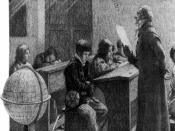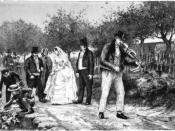Gustave Flaubert's Madame Bovary, published in 1856, was a great success in spite of many accusations that it promoted immorality. Although it was a story of middle class life in a French province it is writing style in which Madam Bovary was composed, not the main theme in the novel, that demands particular attention. This novel continues to be a great controversy with the readers because of the unique fashion in which it was written, which is called free indirect discourse. This is one of the contributing factors to the popularity and longevity of Madam Bovary. Flaubert was taken to trial for this writing and had to defend it from critics who felt it was a novel of demoralization. The impersonal writing style of his novel was brought into the spotlight, and recognized for the true art it contains.
Madame Bovary was written in a form now known as free indirect discourse.
This style of writing makes the reader guess at the point the writer was trying to make, if indeed there is one at all. This writing style affords the opportunity for the narrator/author to tell the story from a non-biased or uninfluenced perspective and still maintain his presence throughout the story. This type of composition was very stimulating to the readers of the late nineteenth century. This is because until Madame Bovary they were always given the author's point of view, comments and opinions on subjects, such as adultery. Above all, whereas most writers perpetually call on the reader to identify with their protagonist, to adopt his viewpoint, share his ambitions, suffer his wrongs, Flaubert does not permit this. In fact, by subtle shifts of tone and perspective, he keeps pushing the reader away from Emma (Works 7). This writing style is only one of the...


